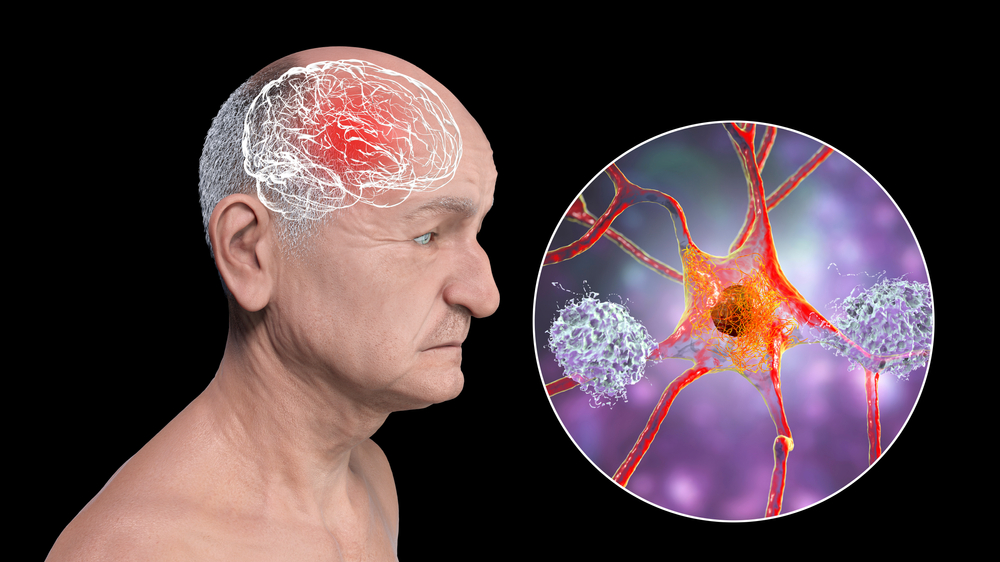Imagine waking up every day unsure of where you are, unable to recall the names of loved ones, or even forgetting how to perform the simplest tasks. For the 55 million people worldwide living with Alzheimer’s disease, this is a reality. The relentless progression of the disease robs not only memory but also identity, making it one of the most devastating conditions for individuals and their families.
But what if a common plant, once thought of as a recreational substance, held the key to slowing this cruel process? Recent studies are shining a new light on marijuana, not just for its familiar psychoactive effects but as a potential treatment for Alzheimer‘s. Scientists are exploring the role of compounds like CBD and THC, which have long been linked to relief for conditions like chronic pain and anxiety, in protecting the brain from the damage Alzheimer’s causes.

What Is Alzheimer’s Disease?
Alzheimer’s disease is more than just a memory problem—it’s a progressive neurodegenerative disorder that slowly steals the ability to think, reason, and remember. It affects over 6 million people in the United States alone, with the numbers steadily increasing as the population ages. This condition isn’t just a gradual decline in memory—it fundamentally alters a person’s identity, relationships, and everyday life. For those living with Alzheimer’s, simple tasks like recognizing loved ones, remembering personal histories, or even managing day-to-day activities become insurmountable challenges.
The disease primarily targets the brain’s memory and thinking centers, causing a buildup of amyloid plaques and tau tangles—misfolded proteins that interfere with cell communication. As these deposits accumulate, neurons (brain cells) become damaged and eventually die, leading to cognitive decline. The resulting damage to the brain is often irreversible, leaving little hope for recovery.
What makes Alzheimer’s even more challenging is the lack of a definitive cure. Current treatments can only temporarily alleviate symptoms, such as memory loss or mood swings, but they do nothing to stop or slow the underlying disease process. As a result, researchers around the world have turned to new, innovative approaches to tackle this devastating condition. One of the most promising avenues currently under investigation is the potential use of cannabis, specifically compounds like CBD and THC, to reduce the brain inflammation and protein buildup that contribute to Alzheimer’s. With millions of families desperately searching for a way to manage or treat this disease, any breakthrough—however small—could offer a glimmer of hope.

The Latest Research on Marijuana and Alzheimer’s Treatment
Recent studies on marijuana’s impact on Alzheimer’s disease have taken a significant step forward, offering new hope in the search for effective treatments. While much of the research is still in the experimental stage, the results are promising enough to warrant serious attention. Two key components of cannabis—CBD and THC—have shown potential for reducing some of the symptoms of Alzheimer’s, particularly agitation, inflammation, and cognitive decline.
One groundbreaking study published by Hopkins Medicine in October 2024 sheds light on the effects of synthetic cannabis on Alzheimer’s patients. The clinical trial demonstrated that synthetic cannabis helped reduce agitation in people with Alzheimer’s, a common and challenging symptom. Agitation often manifests as restlessness, anxiety, or aggressive behavior, and it can significantly impact a patient’s quality of life. The study’s findings suggest that by targeting the brain’s receptors with cannabinoids, synthetic cannabis may provide relief from these distressing symptoms, offering a non-pharmaceutical alternative to traditional treatments.
The promise of cannabis for Alzheimer’s doesn’t stop at agitation. Another key area of research focuses on the role of cannabinoids in reducing inflammation and plaque buildup in the brain. Studies have shown that the cannabinoids in cannabis, particularly CBD, may help reduce the chronic brain inflammation that is a hallmark of Alzheimer’s. Inflammation worsens the buildup of amyloid plaques, which interfere with normal brain function and lead to cognitive decline. By addressing this inflammation, cannabinoids like CBD could help slow the progression of the disease, offering patients and their families a chance at a better quality of life.
Moreover, a 2019 study published in the National Institutes of Health (NIH) reviewed the effects of both CBD and THC on Alzheimer’s disease. The research indicated that when combined, these compounds might have a synergistic effect on brain health. While CBD alone has anti-inflammatory and neuroprotective properties, THC’s ability to interact with brain receptors may help stimulate the production of neurotransmitters that are deficient in Alzheimer’s patients. This combined approach may address multiple aspects of the disease, from reducing plaques to improving cognitive function.

The Science Behind Marijuana and Alzheimer’s

Marijuana isn’t just for recreational use—its medicinal properties have sparked increasing interest in recent years, especially for conditions like chronic pain, anxiety, and even neurological disorders like Alzheimer’s disease. The two main compounds in cannabis, cannabidiol (CBD) and tetrahydrocannabinol (THC), have shown promise in early studies as potential treatments for brain health. But how do they work, and why are scientists so intrigued by their possible impact on Alzheimer’s?
To understand the potential role of cannabis in Alzheimer’s, we need to first look at the brain’s endocannabinoid system (ECS). The ECS is a complex network of receptors and signaling molecules that helps regulate many essential functions in the body, including mood, appetite, and memory. Both CBD and THC interact with these receptors in different ways, influencing brain activity and potentially offering therapeutic effects. While THC is the psychoactive component of marijuana that produces the “high,” CBD is non-psychoactive and is believed to have calming, anti-inflammatory, and neuroprotective properties.
In the case of Alzheimer’s, research suggests that both CBD and THC may help reduce the inflammation in the brain caused by the buildup of amyloid plaques—sticky clusters of proteins that are one of the disease’s hallmarks. Inflammation is a major contributor to the neuronal damage seen in Alzheimer’s, and by modulating the ECS, cannabinoids may have the ability to protect brain cells from this damage. Additionally, studies have shown that these compounds may support the clearance of amyloid plaques, thereby slowing the disease’s progression.
But it doesn’t end there. Some studies have found that cannabinoids like CBD may also encourage neurogenesis—the formation of new neurons. This is especially significant in Alzheimer’s, as the disease causes the death of neurons, impairing cognitive function. If cannabis can stimulate the brain to produce new, healthy cells, it could potentially counteract some of the damage done by Alzheimer’s, offering a glimmer of hope for recovery or even prevention.

What Makes Cannabis a Promising Candidate for Alzheimer’s Treatment?
The potential of cannabis as a treatment for Alzheimer’s isn’t just based on anecdotal evidence or theoretical ideas—it’s rooted in the way cannabinoids interact with the brain and the promising effects they’ve shown in recent studies. While much remains to be understood, several key factors make cannabis a compelling candidate in the battle against this devastating disease.
One of the main reasons cannabis shows promise is due to its anti-inflammatory properties. Alzheimer’s disease is characterized by the accumulation of amyloid plaques and tau tangles in the brain, both of which trigger inflammation and cause neuronal damage. Chronic inflammation in the brain has been linked to the progression of Alzheimer’s, and finding ways to reduce this inflammation could help slow the disease. Both CBD and THC have been shown to possess anti-inflammatory effects, which may help curb this brain-wide inflammation, potentially preventing further damage and easing some of the symptoms.
Additionally, cannabis compounds like CBD are believed to have neuroprotective properties. Neuroprotection refers to the ability to protect neurons from damage and degeneration, which is crucial in a disease like Alzheimer’s. Studies have suggested that cannabinoids may help protect brain cells from oxidative stress and damage caused by free radicals, both of which contribute to the deterioration of brain tissue in Alzheimer’s. By shielding neurons from damage, cannabis could help maintain cognitive function for longer periods, preserving memory, mood, and behavior in patients.
Perhaps even more exciting, research has suggested that cannabinoids may play a role in neurogenesis, or the creation of new neurons. While Alzheimer’s results in the loss of brain cells, the idea that cannabis could promote the growth of new ones opens up intriguing possibilities. Encouraging neurogenesis could potentially repair some of the cognitive damage caused by the disease, offering patients a chance to recover or at least slow the progression of memory loss and confusion.
Finally, the synergistic effects of CBD and THC may be key in offering more comprehensive treatment. While CBD on its own can help with inflammation and neuroprotection, THC may also have cognitive benefits. THC binds to cannabinoid receptors in the brain, and researchers have found that these interactions could help regulate neurotransmitters, such as dopamine and serotonin, that are often disrupted in Alzheimer’s patients. The combination of both compounds could thus target multiple mechanisms involved in Alzheimer’s, from reducing plaque buildup to improving cognitive function.
Real-World Applications and Future Clinical Trials
As promising as the research on cannabis for Alzheimer’s disease is, we are still a long way from seeing cannabis-based treatments become a standard part of Alzheimer’s care. The science is in its early stages, but it’s advancing rapidly, and clinical trials are paving the way for more concrete answers. What does this mean for real-world applications, and how soon could patients see these treatments available?
Currently, clinical trials are underway to explore the effectiveness of cannabis-based therapies for Alzheimer’s. These trials are looking at a range of factors, including the best delivery methods (such as oral pills, oils, or inhalation), optimal dosages, and the combination of CBD and THC that might work best. For example, researchers are testing whether certain formulations of synthetic cannabis or cannabis-derived compounds can help reduce symptoms like agitation, which often leads to hospitalizations or care facility placements. As seen in the Hopkins Medicine study, synthetic cannabis showed promise in reducing agitation in Alzheimer’s patients, suggesting it could be a safe and effective alternative to traditional treatments.
However, while these findings are promising, they also highlight the fact that cannabis-based treatments still have a long way to go before being fully integrated into medical practice. The current research shows that cannabis may help manage symptoms, but it’s not yet clear whether it can slow the disease’s progression or reverse brain damage. Clinical trials are necessary to determine the long-term safety and effectiveness of cannabis, especially given that marijuana’s use in medicine is still a subject of debate in many regions due to its legal status and the complexity of its effects on the brain.



